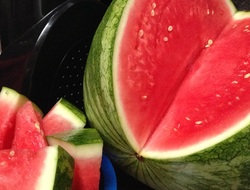
Watermelon Fruit (Xi Gua; Citrulli fructus):
* Meridians: Urinary Bladder, Heart & Stomach
* Taste/Temperature: Sweet/Cold
* Functions:
a) Clears Summer-Heat & generates fluids to quench your thirst;
b) Promotes urination although the rind does a better job of this (so you’ll be going to the bathroom a lot!)
Watermelon Rind (Xi Gua Pi; Pericarpium Citrulli):
* Meridians: Urinary Bladder, Heart & Stomach
* Taste/Temperature: Sweet/Cold
Functions:
a) Promotes urination (more so than the fruit)
b) Clears Summer-Heat & drain Fire
c) You can also rub it on your skin to help decrease acne blemishes.
Watermelon Seed (Xi Gua Zi Ren):
* Meridians: Lung, Large Intestine
* Taste/Temperature: Sweet, Neutral
* Functions:
a) Clear Lung & resolve Phlegm to treat chronic cough.
b) Often ground & taken as a ‘decoction’ with other herbals mixed in hot water to help diurese or clear urinary tract infections. They’re also an excellent source of protein, vitamins, minerals and even some healthy fats.
c) Harmonize the Spleen & Stomach & relax the bowels to treat constipation (again: no long road trips after eating too much of these).
Note of Caution:
If you have symptoms of excess Dampness or Deficient-Cold Stomach/Spleen (these are TCM diagnoses so your Acupuncturist can explain what that means), it’s probably not a good thing to eat a whole watermelon especially if you have weak digestion :-) The same applies if you have excess or uncontrollable urination so don’t take any long road trips ;-D
Having your way with Watermelon:
Chill, slice & enjoy as is. Put chunks of watermelon in your water & sip throughout the day. Pop in the blender for a quick ‘melonade’. You can dry strips of the rind & later make a tea, or (if high blood pressure is not a problem) enjoy a tablespoon of pickled watermelon at your next summer outing.
Enjoy watermelon this summer, and until next time, Happy weeding! Happy healing!
Audrey Steele, L.Ac
Acupuncture Physician
* Disclaimer: This information is not intended to be a substitute for professional medical advice. You should not use this information to diagnose or treat a health problem or disease without consulting with a qualified healthcare provider. Please consult your healthcare provider with any questions or concerns you may have regarding your condition. The information provided is for educational purposes only and is not intended as diagnosis, treatment, or prescription of any kind. The decision to use, or not to use, any information is the sole responsibility of the reader.
References
Bensky, Dan et al. (2004). Chinese Herbal Medicine – Materia Medica. USA: Eastland Press Inc.
Foster, Steven & Hobbs, Christopher. (2002). Western Medicinal Plants and Herbs. NY: Houghton Mifflin Company.
Gurudas. (1998). The Spiritual Properties of Herbs. California: Cassandra Press.
Heinerman, John. (1996). Heinerman’s Encyclopedia of Healing Herbs & Spices. NJ: Parker Publishing Company, Inc.
Jilin, Liu & Peck, Gordon. (2005). Chinese Dietary Therapy. Churchill Livingstone.
Ody, Penelope. (2000). The Chinese Herbal Cookbook – Healing Foods From East and West. Great Britain.
Pitchford, Paul. (2002). Healing With Whole Foods. California: North Atlantic Books.
Sgrol dkar skyabs & Rinchen dbang rgyal. (2009). Tibetan Herbal Legends. People’s Medical Publishing House.
Tierra, Michael & Tierra, Lesley. (1998). Chinese Traditional Herbal Medicine. USA: Twin Lakes.
Swerdlow, Joel. (2000). Nature’s Medicine: Plants That Heal. USA: National Geographic Society.
Warner, Monica. (2007). Herbal Plants of Jamaica. McMillan Publishers Ltd.
Yin-fang, Dai & Zhi-mei, Gong. (1987). Fruit as Medicine. Australia: Rams Skull Press.
Zhongbao, Zhu & Liu, Zhu. (2006). Chinese Herbal Legends. People’s Medical Publishing House.

 RSS Feed
RSS Feed
